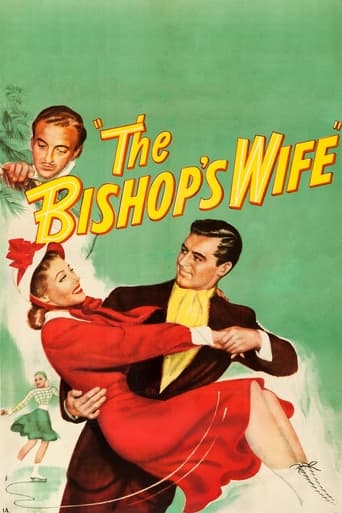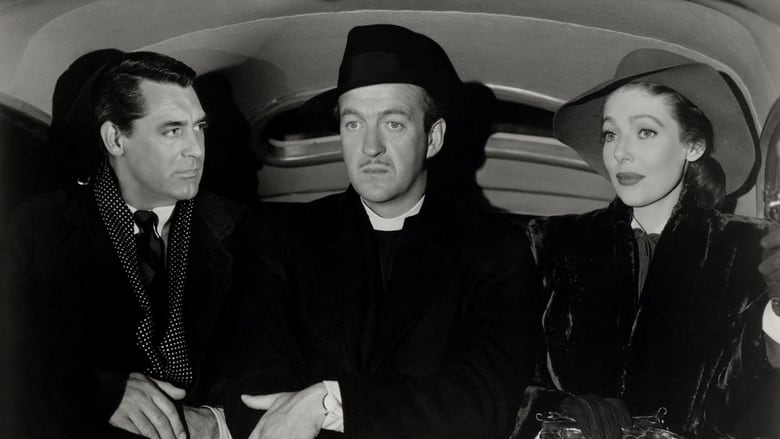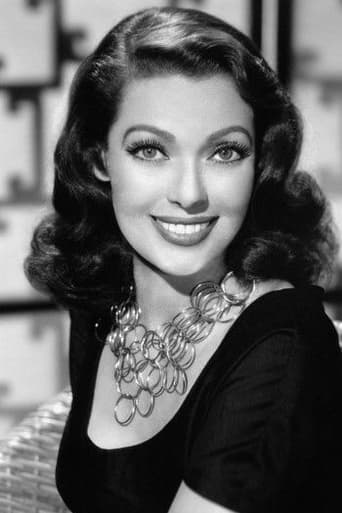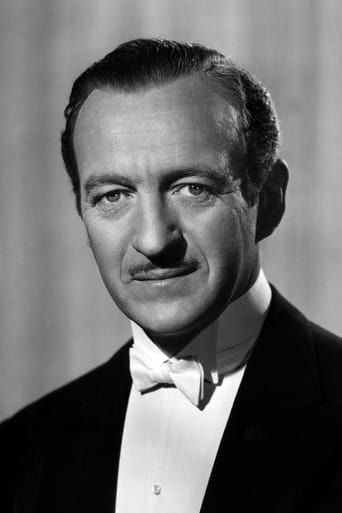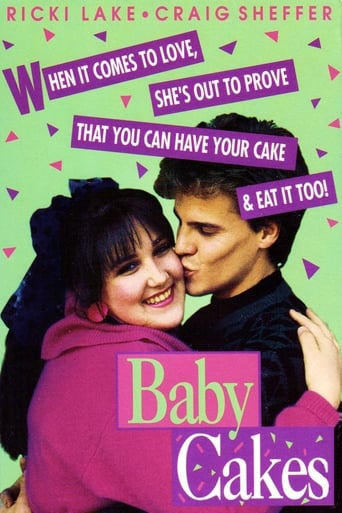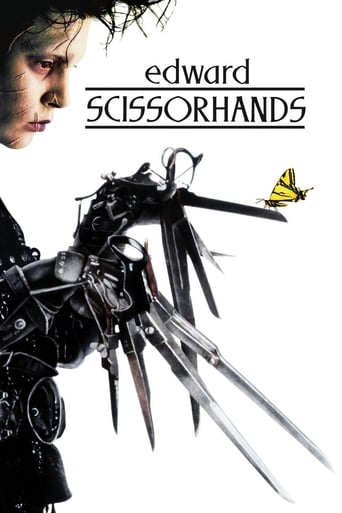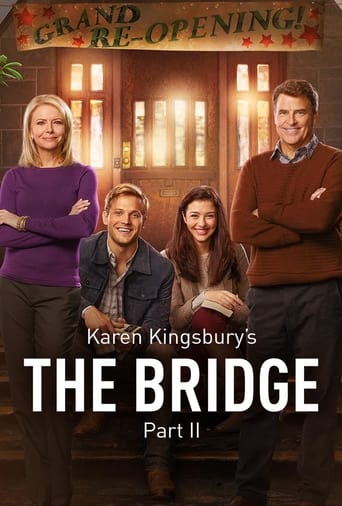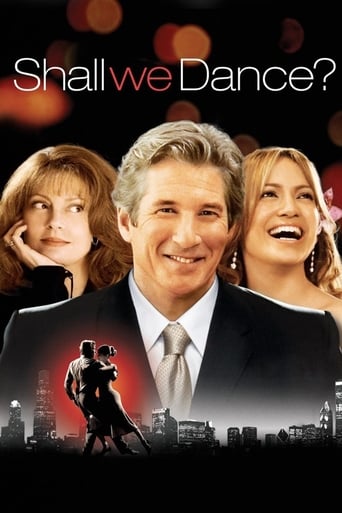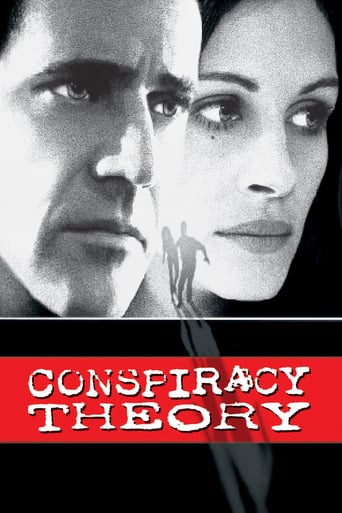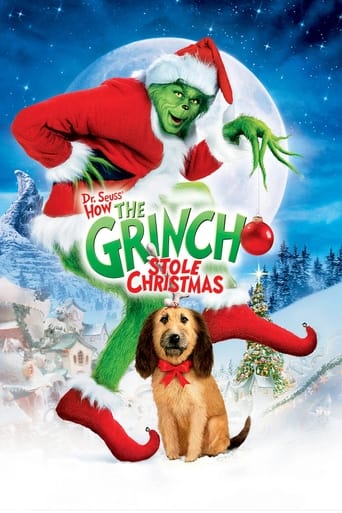The Bishop's Wife (1947)
An Episcopal Bishop, Henry Brougham, has been working for months on the plans for an elaborate new cathedral which he hopes will be paid for primarily by a wealthy, stubborn widow. He is losing sight of his family and of why he became a churchman in the first place. Enter Dudley, an angel sent to help him. Dudley does help everyone he meets, but not necessarily in the way they would have preferred. With the exception of Henry, everyone loves him, but Henry begins to believe that Dudley is there to replace him, both at work and in his family's affections, as Christmas approaches.
Watch Trailer
Cast
Similar titles
Reviews
Overrated and overhyped
Excellent, Without a doubt!!
It is not deep, but it is fun to watch. It does have a bit more of an edge to it than other similar films.
While it is a pity that the story wasn't told with more visual finesse, this is trivial compared to our real-world problems. It takes a good movie to put that into perspective.
In their fifth onscreen pairing, real-life friends David Niven and Loretta Young play husband and wife. He's the bishop, and she's The Bishop's Wife. Niven wants to build a cathedral, but in doing so, he's losing sight of his old ideals. He prays for help, and help is granted, though not in the form he wanted. Cary Grant, an angel, is sent down to Earth, but is he there to help ensure the cathedral is built, or is he trying to remind Niven of what's really important?It's easy to see why The Bishop's Wife is a Christmas classic in most households. The story is interesting, the acting is good, Hugo Friedhofer's music is delightful, and Robert E. Sherwood's and Leonardo Bercovici's script is memorable and wise. I often wondered why the film, and original novel, was entitled The Bishop's Wife, instead of perhaps The Bishop's Visit or even The Bishop's Cathedral. After watching it for probably the twenty-fifth time, I finally understood the title, and the true meaning of the story-just one of the reasons why this classic is so wonderful. Learning something new from the film after 25 viewings is incredible. I won't tell you my take on the story, because it's the type of story that could speak to everyone differently, but the next time you watch it, try really focusing on Cary Grant's purpose. The famous trivia from this movie is that the original male casting was reversed. David Niven was supposed to be the angel, and Cary Grant the bishop. Since I absolutely love The Niv, I think the original casting would have been fine; he would have been as charming and attractive as the angel role required. After all, I fell in love with David Niven in this movie! "Have a chair," Agnes Moorhead offers. "Thank you, I . . . have one," he answers with perfect British comic timing. That was it-my heart was his!I recently bought Robert Nathan's original novel, and after forcing myself through the very depressing, extremely different story, I was filled with even more admiration for the film! I know I'm not heaping quite enough praise on this movie, so I'll try to compliment it some more. In the book, the characters are completely different, and frankly, not who you'd want to waste your time caring about up on the big screen. Sherwood and Bercovici's adaptation of the very difficult novel is incredible. Agnes Moorhead's character, whom some would argue is the most important part of the movie, isn't even in the book! Monty Woolley's character only talks philosophy and history with the angel; he isn't given any other dimensions to his character. In the film, he banters with an old friend, accepts religion in others even though he has none of his own, describes his regret over losing the love of his life, and bolsters the bishop when needed. Some would argue he has the most important role in the film. The character of the angel is also completely different. Can you imagine Cary Grant moping around for two hours, losing his faith and depressing everyone around him? Of course not; it's Cary Grant! He's supposed to put people at ease instantly and make their burdens lighter. His famous smile plays an integral role in the movie, making the story better than Robert Nathan intended. The title character is the only one who's relatively similar to the story; Loretta Young has moments of unexplained depression and disappointment in her life because she either read the original novel or was told to act that way by someone who had. I don't understand how she could be unhappy being married to The Niv, but that's just me. And finally, the bishop. In the novel, he's barely in the story! He's cold and consumed by his work and barely talks to anyone. Bercovici wrote David Niven a wonderful and meaty part, one he plays wonderfully. No one can act out "I'm so frazzled I can't take it anymore!" like David Niven can. On the other side of his face is deep sorrow, one that isn't explained in the film but can be imagined by the audience. Perhaps his character was disappointed by aspects of his life, perhaps he inserted unwritten frustrations to back up his character's inner crisis, or perhaps he was completely unaware of that element of his performance. In real life, he'd just suffered a terrible tragedy, so it's possible his own sadness subconsciously added to his onscreen character.The Bishop's Wife holds a special place in my family's Christmas tradition, and not just an annual viewing of the film. David Niven gives a Christmas sermon, and he talks about the true spirit of the season, reminding his listeners that as they hang up everyone's stocking, there's one stocking that remains unhung. At our house, because of that speech, we hang up an extra stocking every year. Just another thing to think about as you watch this delightful Christmas staple, with a supporting cast of James Gleason, Elsa Lanchester, Sara Haden, Robert Keith, and two children also seen in It's a Wonderful Life, Bobby Anderson and Karolyn Grimes.
I love this film! I usually watch this about 3 or 4 times during the Christmas season as it's in my rotation with Home for the Holidays, It's a Wonderful Life, Miracle on 34th Street, One Magic Christmas, If You Believe, Bell, Book, and Candle, A Diva's Christmas Carol, and The Family Stone. My roommates hate me during this time of year! I like to think there are people out there that believe in helping others unselfishly. I strive to be that kind of person.I like seeing some of the other character actors such as Elsa Lanchester who is in Bell Book and Candle, and Sara Haden who I only knew from the Shirley Temple movie Poor Little Rich Girl. Oh and two of the children from It's a Wonderful Life...Zuzu and young Harry Bailey. Definitely watch this one! I think it's way better than the remake, although Denzel and Whitney are great!
Yes, this is a sentimental piece with an overtly Christian message, but it is a very fine movie nonetheless.Viewers can savor the expert characterizations of Cary Grant as Dudley the angel, contrasted with David Niven's stressed-out bishop Henry Brougham. Their acting-styles are very different: Grant moves languidly across the screen, as if in control of everything he does. The only time when self-doubt enters his mind is when he inadvertently falls for Hanry's wife Julia (Loretta Young). At that moment director Henry Koster frames him in close-up looking longingly as the viewer, making us realize just how attracted he is to her. But no matter; as an angel, he cannot savor the delights of corporeal existence, and must return to heaven to undertake God's bidding. By contrast Niven's Bishop is full of nervous tics; his hands shake as he picks up a teacup (having discovered Dudley's true identity), and he tries to impose his will on Dudley by wielding a stick of celery. In one memorable sequence he finds that he is stuck to a chair in Mrs. Hamilton's (Gladys Cooper's) house, and he waddles around the room like an angry duck, desperately trying to remove it, before sinking down into a corner and picking up the telephone.The two male stars' comic talents are shown to greatest effect in a dinner-scene, where the Bishop stretches out his hand to stroke his pet St. Bernard dog, yet finds to his horror that the dog has moved over to Dudley's side. The Bishop looks up and scowls at Dudley; Dudley simply raises his eyebrows, forcing the Bishop to climb down to avoid having an unseemly argument. Both Niven and Grant possessed fine comic abilities, and Koster allows them full rein to exercise their range of facial expressions.The film benefits from a strong supporting cast, including Young as a harassed housewife redeemed from drudgery by Dudley's intervention; Monty Woolley as a distinguished professor who eventually admits that he has spent the last few years of his life in utter idleness; Elsa Lanchester as an unusually high-spirited parlor-maid; and James Gleason as a cab-driver learning how to skate once more.The subject-matter is very much of its time, as Mrs. Hamilton is dissuaded from giving $1m. for the building of a cathedral in her husband's honor, and to use the money instead to house the poor both in the United States and elsewhere. This was considered far more significant in the post-war world, where members of different nations were learning how to co-exist in peace and harmony as well as rebuild themselves. This perspective holds as true today as it did over six decades ago, especially in a world where the distinction between rich and poor seems to widen rather than contract.
I discovered this movie on TV many years ago, never having heard of it previously, but what a joy, being able to call on such talents as Niven, Grant and Loretta Young, not to mention stalwart supporting players such as Gladys Cooper, Monty Woolley and Elsa Lanchester, gave the studio a head start of course. The movie might be seen as sentimental nowadays (though why that's a pejorative I don't know). In fact I think a better word is sensitive. It's apparently simple tale of an Angel being sent down to help a misguided but essentially good Bishop who has lost sight of the real Christian way, is given a human edge and saved from schmaltz by having the Bishop become jealous of the Angels affections for the Bishops wife, and with reason, indeed the Angel does have human feelings for her! Sensitivity is the mark of its treatment of the characters and their flaws, the atheist, the rich widow etc. if even in our secular world Christmas encourages us to reevaluate our priorities in light if Christian teaching, it's a good checkpoint in our too busy and often misguided lives. This movie is a warm hearted and entertaining nudge in the same direction, and we need it. After all were only human!
